In November, Dr. Aubrey de Grey, a graduate of the University of Cambridge, was in Spain to attend the Longevity World Forum in the city of Valencia, and he gave a press conference organized by his friend, MIT engineer José Luis Cordeiro.
Dr. Aubrey de Grey is the scientific director (CSO) and founder of the SENS Research Foundation. In Madrid and Valencia, Dr. de Grey reaffirmed for Tendencias21 one of his most striking statements of 2018: “In the future, there will be many different medicines to reverse aging. In five years, we will have many of them working in early clinical trials.”
The Longevity World Forum is a congress on longevity and genomics in Europe. It is heir to the first congress in Spain, the International Longevity and Cryopreservation Summit, which was held at the CSIC headquarters in Madrid in May 2017, and Dr. de Grey also participated in that event. In Valencia, his presentation was recieved with interest, and Dr. de Grey explained to this select audience that aging will be treated as a medical problem in the near future. Rather than treating its symptoms using the infectious disease model, the root causes of aging will themselves be treated.

It was published recently on longevityworldforum.com that a therapy to reverse aging will be a reality within five years. What will be its mechanism of action, roughly?
There will not be just one medicine; there will be a lot of different medicines, and they will all have different mechanisms of action. For example, some of them will be stem cells, where we put cells back into the body in order to replace cells that the body is not replacing on its own. Sometimes, they will be drugs that kill cells that we don’t want. Sometimes, they will be gene therapy treatments that give cells new capabilities to break down waste products, for example. Sometimes, they will be vaccines or other immune therapies to stimulate the immune system to eliminate certain substances. Many different things. In five years from now, we will probably have most of that working. I do not think that we will really have it perfect by then; probably, we will still be at the early stages of clinical trials in some of these things. Then, we will need to combine them, one by one, to make sure that they do not affect each other negatively. So, there will still be some way to go. But, yes, I think it’s quite likely that in five years from now, we will have everything, or almost everything, in clinical trials.
Then clinical trials for seven years until it’s perfected. Don’t clinical trials usually take a long time?
It depends. For example, in aging, because there is this progressive accumulation of damage, you could have therapies that slow down the rate at which damage accumulates, or you could have therapies that repair the damage that has already happened. The second type of therapy is what we think is going to be most effective and is going to be easiest to do, and you can see results from that very quickly, like in one or two years. Now, of course, you still want to know what happens later on, but the first thing is to determine whether this is working at all, and as soon as it starts to work, then you can start to make it available. Clinical trials are changing in that way. Historically, clinical trials had to be completed before anybody could get these drugs, but now we are getting new policies; there is a thing called adaptive licensing, which is becoming popular in the US and elsewhere, where the therapy becomes approved at an earlier stage, and then it’s monitored after that.
Beyond the humanitarian perspective of avoiding the pain and suffering that comes with old age, if increasing the years of healthy life in people will significantly reduce health care spending by governments, why don’t they promote research in this area?
You’re absolutely right. It’s quite strange that governments are so short-sighted. But, of course, the real problem is psychological: it’s not just governments that are short-sighted. Almost everybody in the world is short-sighted about this. The reason I believe why that’s true is people still can’t quite convince themselves that it’s going to happen. Since the beginning of civilization, we have known that there is this terrible thing called aging, and we have been desperate to do something about it, to get rid of it. And people have been coming along, ever since the beginning of civilization, saying, “Yes, here’s the solution, here’s the fountain of youth!” And they’ve always been wrong. So, when the next person comes along and says they think they know how to do it, of course, there is going to be some skepticism until they have really shown that it’s true. Of course, if you don’t think it’s going to work, then you’re not going to support the effort financially. It’s very short-sighted, but it’s understandable.
Why do you think that the pharmaceutical industry does not devote its research and development efforts to this area, which causes the death of 100,000 people every day?
Today, the pharmaceutical industry is geared toward keeping old people alive when they are sick. It makes its money that way. It’s not just the pharmaceutical industry, it’s the whole of the medical industry. And so, most people say that they are worried that maybe the pharmaceutical industry will be against these therapies when they do come along. I don’t think that’s true at all. I think they will be in favor because people will be in favor, but people are not really in favor yet. People don’t really trust preventive medicine. They think “Okay if I am not yet sick…” They don’t trust medicine in general; they know that this is experimental. So, when they are not yet sick, they think “Well, I’ll wait until I am sick,” but we can change that. Eventually, people will understand that it’s going to be much more effective to treat yourself before you get sick, and then the whole medical industry will just respond to that; they will make the medicines that people want to pay for.
So you don’t think that they will be against these therapies?
No. They will follow.
But now, they are not focusing their research into this field.
That’s right because they don’t need to. The big pharmaceutical companies don’t really do much of their own research in the first place. They just wait to see what happens, and then they buy small companies.
In the car analogy that you use, you say that a car is built to last 10 or 15 years, but with proper maintenance, it can last up to 100 years. Isn’t this expressing the idea that aging is programmed and that the life of a car is also programmed?
No, it’s not. All of you know that, a long time ago, Henry Ford invented a concept called planned obsolescence, which was a way of building a car so that you could predict pretty accurately how long it would last. But, of course, the only reason that the prediction works is because people are lazy, and they don’t mind replacing their cars, so they only do the minimum amount of maintenance that the law tells them to. The reason that some cars last 100 years is not because those cars were built differently, it’s because there are a few people out there who fall in love with their cars and they don’t want them to get old. So, it really is exactly the same. In the human body, we have aging, because there are certain types of damage that are not automatically repaired when they happen. Of course, many types of damage in the human body are repaired automatically when they happen, so we don’t need medicine for that, but some of them are not. So, if we can develop medicines that do fix those things, it’s exactly the same as with a car.
If aging is not programmed, why do different species have different lifespans?
Because they have different qualities of built-in repair machinery. When I talk about all these types of damage, they are the types of damage that accumulate in the body, and they accumulate because the body does not have ways to repair them. There are massive amounts of other types of damage that I don’t call damage, and the reason I don’t call them damage is because they don’t accumulate. The reason that they don’t accumulate is because we already have built-in machinery to repair them when they happen. So, long-lived species have more comprehensive automatic repair machinery built into them.
Do you think that first we can focus on just replacing organs and restoring their function, and eventually we can eliminate the root causes of aging? Once we reach longevity escape velocity, maybe we can focus on just eliminating it?
We will never be able to stop the body from creating this damage. The body is going to do that because it is intrinsic to metabolism, but the better we get at repairing the damage, the fewer problems we have.
What healthy habits do you follow now?
I don’t do healthy habits. I’m lucky, I don’t need to do anything; I can drink whatever I like and nothing happens. I don’t even do much exercise, and also I don’t get nearly enough sleep, which is probably shortening my life, but it is worth it because I am hastening the defeat of aging, so it is a net positive.
Which generation will live to be a thousand years old? Do you think it is born already?
I think it is very probably born already, yes. But, of course, we cannot know until we get the medicines.
Which country do you think is more aware, or the people is more aware that this is a problem that we need to fix?
I would say Russia.
Russia?
Yeah. Surprising, isn’t it? But when I go to Russia and I talk about all of this, it’s so wonderful; I don’t get any of the uninformed questions, and everyone seems to understand it.
They don’t ask you ethical questions?
That’s right, yeah. They understand that this is a medical problem, it needs to be fixed, and it can be fixed.
Kriorus [the first and only cryonics company in Eurasia] is there right?
Yeah, I know Kriorus, I know the people very well.
Alcor [the world leader in cryonics located in Arizona] is the most expensive.
It gives the best service. I mean, it makes sense to have a very expensive, high-quality service and also less expensive and lower quality service. That is normal.
Where are you currently living?
I live in the United States, but I go everywhere when I am invited to speak and so on.




